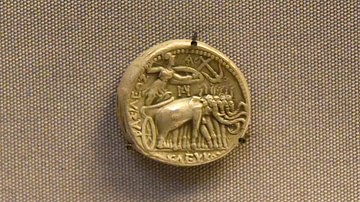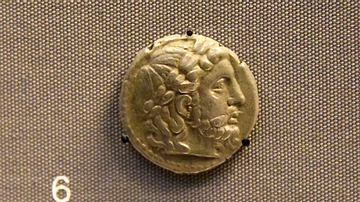Search
Did you mean: Eleusis?
Search Results

Definition
Lysimachus
Lysimachus (c. 361-281 BCE) was one of Alexander the Great's trusted bodyguards and a member of his Companion Cavalry. Although he obtained Macedonian citizenship, his father was a Thessalian named Agathocles. After the death of Alexander...

Definition
Demetrius I of Macedon
Demetrius I of Macedon, also known as Demetrios Poliorcetes, the 'Besieger' (c. 336 - c. 282 BCE), was a Macedonian king who, along with his father Antigonus I, fought for control of Alexander the Great's empire in the 'Successor Wars'. After...

Image
Tetradrachm Coin from Seleucid Syria
This is a silver tetradrachm coin. Reign of Seleucos I Nicator, 305-281 BCE. From Seleucid Syria. Donated by the Bank of England. (The British Museum, London).

Article
The Hellenistic World: The World of Alexander the Great
The Hellenistic World (from the Greek word Hellas for Greece) is the known world after the conquests of Alexander the Great and corresponds roughly with the Hellenistic Period of ancient Greece, from 323 BCE (Alexander's death) to the annexation...

Definition
Mauryan Empire
The Mauryan Empire (322 BCE - 185 BCE) supplanted the earlier Magadha Kingdom to assume power over large tracts of eastern and northern India. At its height, the empire stretched over parts of modern Iran and almost the entire Indian subcontinent...

Definition
Sogdiana
Sogdiana (or Sogdia) is a region in Central Asia between the mighty rivers Iaxartes in the north and Oxus in the south. Its eastern and western limits are more difficult to determine, especially since the toponym Sogdiana covered different...

Article
The Great Jewish Revolt of 66 CE
The Roman Empire in the early 1st century CE was often regarded as the perfect empire. The outstanding military prowess of the Romans was used to expand the empire, and once the territories were acceptably pacified, Roman political power...

Image
Map of the Successor Kingdoms, c. 303 BCE
Map of the Diadochi successor kingdoms to Alexander the Great's empire, before the Battle of Ipsus (301 BCE).

Image
Seleucus I Nicator
Portrait of Seleucus I Nicator ( Victor), one of the successors to the kingdom of Alexander the Great upon his death in 323 BCE. This portrait is Roman and is dated to the 1st or 2nd century CE. It was found in Syria. (Louvre Museum, Paris)

Image
Seleucid Silver Tetradrachm Coin
This silver tetradrachm coin belonged to Seleucus I. Reign of Seleucus I Nicator, 305-281 BCE. From Seleucid Syria. Donated by the Bank of England. (The British Museum, London).